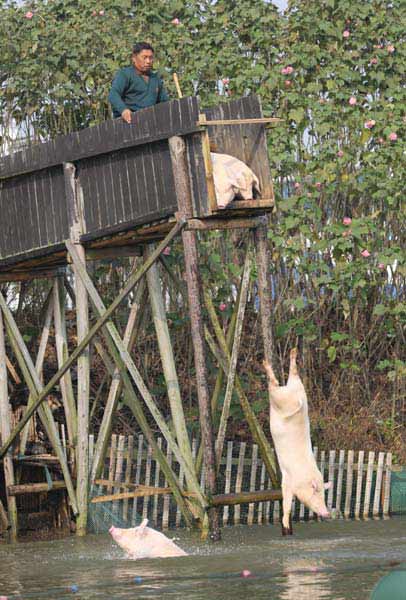
 |
| Farmer Huang Demin forces his pigs to dive into a river below to "boost the animals' appetite" at Guanshan village in Hunan province on Nov 11. [Photo/China Daily] |
Qiao said his company, one of China's largest dairies, began to adopt animal welfare policy 12 years ago and saw its annual milk yield rise from 6 to 7 metric tons to about 11 tons.
Pressure from fulfilling international obligations and combating "green" trade barriers also provided motivation for the new guidelines, according to Jia Zili at the animal health service and welfare branch.
Jia said the regulation is framed under the basics of the Terrestrial Animal Health Code, issued by World Organization for Animal Health, of which China is a member state.
With more than 661.7 million pigs slaughtered each year, China is the world's largest pork producer, accounting for almost half of total global output. Exports, however, account for only 6.57 million tons, less than 1 percent, according to the 2011 annual report on China's pig industry, released by the National Swine Industry Technology Center, co-founded by the Ministry of Agriculture and the Ministry of Finance.
The story is similar in the beef and chicken industries.
"Part of the reason for the low level of exports is the lack of animal welfare and sanitary standards (in China), so export to major markets such as the European Union is impossible," Jia said. "Writing animal welfare into Chinese legislation would certainly have an impact in the international market where increasing demand animal welfare products sets a green trade barrier."
Qu Bin, quality director for Husi Food, which has been the sole supplier for McDonald's in China for more than two decades, said: "Animal welfare is a brand in the international market.
"Doing business with other countries, we have to play by their rules," Qu said. "With the regulation, we hope more Chinese companies will follow quality practices, providing us more choices in upstream companies."















 Landmark building should respect the public's feeling
Landmark building should respect the public's feeling


![]()
